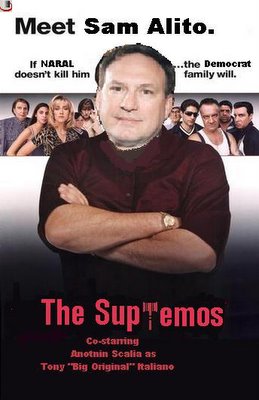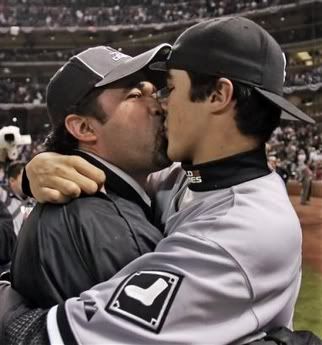President Bush has nominated Harriet Miers for SCOTUS. As is well documented here and elsewhere, some conservative minded folks are upset at this uber-stealth candidate. I am one of those folks.
The conservative supporters of the President's choice repeat the mantra that we should "trust" this President. After all, he nominated a few people who were "so conservative" in their judicial philosophy, and the Democrats disliked so much, that they made asses of themselves by filibustering ABA "qualified" and "highly qualified" candidates.
President Bush promised in his campaign to appoint Judges in the mold of Scalia and Thomas to the Supreme Court. While I do not agree with these guys all the time, they are clearly the class of legal thought on today's SCOTUS. And I concede that Thomas did not make me excited when he was appointed, though at that time I would be considered much more liberal in my world view of Constitutional law. Not all of of those thoughts have disappeared.
Anyway, I wanted to take a quick look at the "trust me" President. Should we trust President Bush on issues of Constitutional law? Should we trust that he has picked a potential justice, in light of the fact that we will likely have nothing to work with other than her hearings, during which every candidate since Bork says the same thing? Should we trust him that in addition to his campaign promises,
he also takes an oath to uphold the Constitution.
Should we trust Bush on this subject? In a word: NO.
Think for a moment about the Supreme Court decisions of the last few years that most upset the conservative side of the blogosphere and punditry. A few come to mind quickly. McCain-Feingold. Kelo. The medical marijuana case. Where was Bush on these?
Well,
Bush signed the awful McCain-Feingold bill. Oh, he mentioned a few "constitutional concerns" in his press release.
Certain provisions present serious constitutional concerns. In particular, H.R. 2356 goes farther than I originally proposed by preventing all individuals, not just unions and corporations, from making donations to political parties in connection with Federal elections.
But even those concerns were limited to individuals. Unions and corporations don't have First Amendment rights Mr. President? But no matter. Signing the bill was a campaign promise broken.
Mr. Bush's decision to sign the bill was especially disappointing because he had declared in 2000 that he would only sign something that contained several key principles. One of those, according to his campaign literature, was: "Preserve the right of individuals and groups--from the Christian Coalition to the Sierra Club--to run issue ads. Sen. McCain would protect incumbents from scrutiny by unconstitutionally restricting the rights of citizens to engage in issue advocacy." This bow to the First Amendment was one reason some people supported Mr. Bush over John McCain. Yet in the end, Mr. Bush signed McCain-Feingold even though it violated nearly all of those principles.
When the case hit the Supreme Court, McConnell v. FEC was decided adversely to the First Amendment. Conservatives were in an uproar. Surely, Bush realized what a travesty this law was?
No. The administration defended the law before the Supreme Court.
Supporters of the law, including the Bush administration, say it is designed to prevent corruption in politics. . . . In his brief outlining the government's position, Solicitor General Theodore Olson wrote, "Both in campaign-finance legislation and in a broad range of other laws, Congress has limited the flow of money to federal officers in order to safeguard the integrity of government operations. Because federal elected office-holders are inextricably linked to their political parties, Congress reasonably concluded that large donations to party committees pose a threat of corruption similar to that created by large donations to candidates."
McCain-Feingold passed both houses with less than 2/3 of the vote. Who do we have to thank for this monstrosity of constitutional law legislation? President Bush, more than any single person. Thomas and Scalia, Bush's model judges, disagreed with Bush's position on this.
Next, we have the awful decision decried by every right of center and libertarian pundit out there: Kelo v. New London. This case came before the Supreme Court just last year. Surely, the conservative constitutionalist President Bush would have his administration's attorneys and the Department of Justice take a position on this groundbreaking, important eminent domain decision.
No. Thomas and Scalia dissented. Bush said nothing.
But trust President Bush. He knows what is important in constitutional law.
We also have the nice, security oriented story of Mr.
Jose Padilla. Mr. Padilla is accused of being a
terrorist by the
United States government. He is currently being detained without charge in a South Carolina military prison under orders of President Bush.
Padilla is a United States citizen. He was "captured" on U. S. soil. He has been held since May 8, 2002. No charges have been filed. No due process is being permitted. The Bush administration denies that he has any rights against the government's denial of his liberty since he is being "called" an enemy combatant. There is no public evidence that he ever held a weapon in opposition to the U. S. We are not in a declared state of war with anyone. Yet
Bush declared that Padilla will be held indefinitely and only Bush can decide whether Padilla is an enemy combatant.
Now, some sincere conservatives are OK with this. Even Judge
J. Michael Luttig, whom I would support for SCOTUS, ruled with a 4th Circuit panel in favor of Bush over Padilla this year. Nonetheless, there is ample
conservative concern over this case in particular. Padilla is not like Gitmo. He was not captured on a battlefield or in foreign territory. He was not a foreign citizen. Each of these differences is huge.
The Constitution does not extend outside U.S. borders; immigrants can have conditional rights. Within the U.S. however, the 6th Amendment does not limit its application to subclasses of persons. The 14th Amendment guarantees all "persons" due process and all "citizens" their privileges and immunities. How is Padilla different? Trust Bush - he is.
Finally, by way of example, we have the medical marijuana case,
Gonzales v. Raich.
Well articulated outrage and
confusion from the conservative punditry, as well as extreme disappointment with Scalia's concurrence, followed.
Where was Bush on this case? Surely he recognized the limits to the commerce clause and the importance of federalism? Are you joking? The Gonzales in the case was Attorney General Alberto Gonzales, appointed by President Bush. This case came to the Supreme Court precisely because Bush thought it important to trample federalist principles in favor of a uniform, Federal policy on drug laws. The case hearkened back to the days of Wickard v. Filburn, a case I will identify as one of the 10 worst Supreme Court opinions of all time one day in the near future *cough*.
Thomas dissented, thus disagreeing with Bush. As stated above, Scalia somehow found himself in the majority.
Well, I need to work. I could research this more, and encourage others to remind me of things I may have overlooked. Suffice it say that the Supreme Court constitutional law cases that my readers have complained about most the last few years (with the possible exception of Padilla, which has more support than the others) all have Bush on the "bad" side.
That is not the record of a President I just "trust" on Constitutional issues.




















 Vampire novelist extradornairre Anne Rice has written a cult following of book about vampires. Apparently,
Vampire novelist extradornairre Anne Rice has written a cult following of book about vampires. Apparently,  Personally, I think Anne Rice found Jesus after yelling his name when she found out Tom Cruise would be playing her primary vampire character.
Personally, I think Anne Rice found Jesus after yelling his name when she found out Tom Cruise would be playing her primary vampire character.

 Apparently there is a website out there called
Apparently there is a website out there called 

 Saddam, playing games this morning in his trial,
Saddam, playing games this morning in his trial,  Go read the many fine articles of the LLP Group and friends at
Go read the many fine articles of the LLP Group and friends at 






 The inventor of artificial testicles for dogs (one version pictured at right won an Ig Nobel prize for 2005 on Thursday.
The inventor of artificial testicles for dogs (one version pictured at right won an Ig Nobel prize for 2005 on Thursday.
 The
The  The press has picked up on nominee Miers'
The press has picked up on nominee Miers' 














